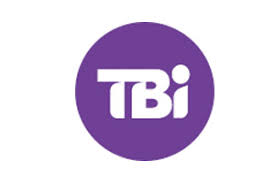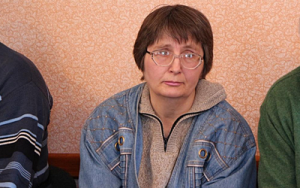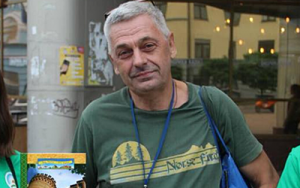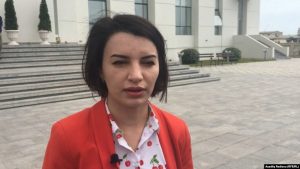11 Jun 2019 | Global Journalist, Media Freedom, media freedom featured, News and features, Turkey
[vc_row][vc_column][vc_column_text]This article is part of Index on Censorship partner Global Journalist’s Project Exile series, which has published interviews with exiled journalists from around the world.[/vc_column_text][vc_column_text] When Turkish journalist Arzu Yildiz reported a major scoop in 2014, she had little idea that the story might lead to the end of her journalism career, the loss of her home, and separation from her family.
When Turkish journalist Arzu Yildiz reported a major scoop in 2014, she had little idea that the story might lead to the end of her journalism career, the loss of her home, and separation from her family.
Yildiz, then a reporter for the Turkish news site T24, was the first to report that local prosecutors in southern Turkey had intercepted a convoy of trucks bearing Turkish arms heading for Syria.
The disclosure had put Recep Tayyip Erdogan’s government in an awkward position, since Turkey had long denied that it was sending aid to rebels fighting Syrian President Bashar al-Assad’s government.
When Yildiz later published footage of the of the prosecutors being put on trial, she herself was sued by the government. In May 2016, she was stripped of the guardianship of her two young children and sentenced to 20 months in jail – a decision which was stayed pending the approval of an appellate court.
But then Turkey’s climate for the press, already bad, took a sharp turn for the worse. In July 2016, a group of dissident Turkish military officers attempted to overthrow Erdogan in a coup. When it failed, Erdogan’s response was ferocious. Tens of thousands of soldiers and government workers were purged and media outlets viewed as critical of Erdogan were shuttered. In the aftermath, more than 300 journalists were arrested. As for Yildiz, after security forces appeared at her home with a warrant for her arrest, she and daughters Emine, then 7, and the infant Zehra, went into hiding. They lived in secrecy in a single room for five months.
“I could not continue living in this one bedroom,” she says. “It begins to affect you psychologically. Every time the door is knocked, you would think it was the police.”
In November 2016, Yildiz left both girls with their grandparents and fled across the border to a refugee camp in Greece. She was quickly given asylum in Canada and moved to Toronto by herself. In 2018, her eldest daughter Emine joined there, but Zehra, now 3, remains in Turkey.
Now working in a pizzeria in Toronto, Yildiz, 39, spoke with Global Journalist’s Lara Cumming about her career and the high personal cost of doing independent journalism in Turkey. Below, an edited version of their interview:
Global Journalist: How did you get into journalism?
Arzu Yildiz: After I finished school, I was a court reporter for a long time. I reported on the police and the justice system. I never cared about politics or the government I only focused on justice. I worked with Taraf [a liberal Turkish national newspaper] for over five years. After this I tried doing journalism independently at T24 for a couple of years.
For two months I worked [for a newspaper] close to Erdogan’s party, a big newspaper called Türkiye. But they censored my news. After that I quit. All this time, I may be the only woman court reporter who knows the law as much as a prosecutor or judge. When I was doing journalism, I was studying the law. Some prosecutors didn’t read as much as me. I was interested in not only the justice system of Turkey but also the justice [systems] of the world.
GJ: How did you know it was time to leave Turkey?
Yildiz: Two days after the July 15th [2016] coup attempt, the police came to my house. After the coup attempt, a lot of [arrested] people faced torture and no one would have written about it. If I continued to be a court reporter, I would write what is really going on in court and why people were detained.
After the police came, I lived an underground life for five months. One of my daughters was just 7 months old and the other was 7 years old. We lived in one room together.
[Later] I realized that this is no life. I tried to give them a chance. I could not continue living in this one bedroom. It begins to affect you psychologically. Every time the door is knocked, you would think it was the police.
GJ: Are you still in contact with your family in Turkey?
Yildiz: The little one doesn’t know me or who I am, she has no mother. She is in Turkey with my parents. I saw her birthday only through video. I have no contact with her, no telephone calls, no nothing. I divorced my husband and I have no contact with my mother and father also. They lost their daughter too. I didn’t only lose mine.
The [eldest] one had a U.S. visa before. She came to the U.S.A. alone [in September 2018]. One of my friends took her to the Canadian border. My other daughter had no chance to come to Canada. They will not give her a passport because of me.
My mother is 73-years old, when this situation is over I don’t know what will happen. I may never see them [my parents] again. The Canadian government will not issue them a visa.
Some say: “Meet them in another country.” They must think I’m very rich. I cannot go to Ottawa right now because I am working two jobs and only just paying my rent. All of the family is affected, three generations. My oldest daughter, who is with me, always asks why we are separated from her grandparents. My children referred to my mother as their mother.
GJ: What issues did you see with journalism in Turkey before you left?
Yildiz: My goal as a journalist was seeking truth. We have no goals to be heroes or to be famous. We are not actors. We are not singers. We are journalists. The goal is to tell what’s right and who the heroes are through our stories. And if the world starts talking about them, I can say I did my job well.
My problem is with the bureaucracy. I cannot trust politicians, but I should be able to trust the judges. For example, if people drive unsafely in Canada they will be punished by the justice system. They are not scared of the politicians, they are scared only of the justice system. In Turkey there is no trust of the judicial system.
I am not a religious person and I do not believe in any religion. Religion and racism are just the tools the politicians use for their benefit. I believe only in humanity. If I am dying, I do not want someone to define me only as a Turkish journalist but as a human. I do not care how a person looks or what they believe, only if they are honest. If you are a court reporter – like me – your only focus is if someone is innocent or if they are a criminal.
GJ: Do you have any plans to return to Turkey?
Yildiz: Before I came to Canada, I spent time in a refugee camp. The real meaning of being a refugee is not only the loss of the country, but loss of a family and being alone. I came with one t-shirt and no shoes. Believe me, I lost the shoes in the refugee camp.
I came with only cheap things. No mobile phone no nothing. Maybe $200 and that’s it. I will not be able to return to Turkey as they will put me in prison.
GJ: Has the pursuit of your work been worth it? You have done such brave work but also lost so much.
Yildiz: I lost so many things, no one can imagine. If I had the chance to return to the past, I would do this again. But one thing is broken: my heart.[/vc_column_text][/vc_column][/vc_row][vc_row][vc_column width=”1/2″][vc_video link=”https://youtu.be/6BIZ7b0m-08″][/vc_column][vc_column width=”1/2″][vc_column_text]Index on Censorship partner Global Journalist is a website that features global press freedom and international news stories as well as a weekly radio program that airs on KBIA, mid-Missouri’s NPR affiliate, and partner stations in six other states. The website and radio show are produced jointly by professional staff and student journalists at the University of Missouri’s School of Journalism, the oldest school of journalism in the United States. [/vc_column_text][/vc_column][/vc_row][vc_row][vc_column][vc_custom_heading text=”Don’t lose your voice. Stay informed.” use_theme_fonts=”yes”][vc_separator color=”black”][vc_row_inner][vc_column_inner width=”1/2″][vc_column_text]Index on Censorship is a nonprofit that campaigns for and defends free expression worldwide. We publish work by censored writers and artists, promote debate, and monitor threats to free speech. We believe that everyone should be free to express themselves without fear of harm or persecution – no matter what their views.
Join our mailing list (or follow us on Twitter or Facebook). We’ll send you our weekly newsletter, our monthly events update and periodic updates about our activities defending free speech. We won’t share, sell or transfer your personal information to anyone outside Index.[/vc_column_text][/vc_column_inner][vc_column_inner width=”1/2″][gravityform id=”20″ title=”false” description=”false” ajax=”false”][/vc_column_inner][/vc_row_inner][/vc_column][/vc_row][vc_row full_width=”stretch_row_content”][vc_column][three_column_post title=”Global Journalist / Project Exile” full_width_heading=”true” category_id=”22142″][/vc_column][/vc_row]
31 May 2019 | Ukraine Incident Reports
[vc_row][vc_column][vc_column_text]
Index on Censorship’s Monitoring and Advocating for Media Freedom project tracks press freedom violations in five countries: Azerbaijan, Belarus, Russia, Turkey and Ukraine. Learn more.
[/vc_column_text][/vc_column][/vc_row][vc_row][vc_column][vc_custom_heading text=”9 Incidents” use_theme_fonts=”yes”][vc_custom_heading text=”Online outlet correspondent assaulted by politician” font_container=”tag:h3|text_align:left” use_theme_fonts=”yes”][vc_column_text]16 May 2019 — Oleg Baturin, New Day online outlet correspondent, was assaulted by a deputy of the Kherson regional council in Kahovka. The official blocked the journalist, grabbed his hands and threatened to cripple him.
Link(s): http://nikcenter.org/newsItem/50465
http://nk-online.com.ua/kahovskiy-zhurnalist-ne-hochet-stat-kalekoy-poetomu-obratilsya-v-politsiyu/
Categories: Physical Assault/Injury
Source of violation: Government/State Agency/Public official(s)/Political party[/vc_column_text][vc_custom_heading text=”Journalist assaulted by a government official in Kyiv” font_container=”tag:h3|text_align:left” use_theme_fonts=”yes”][vc_column_text]15 May 2019 — Volodymyr Tymofiychuk, 1+1 TV Channel correspondent, was assaulted by a government official in Kyiv. The official pushed the journalist, grabbed his clothes and hands.
Link(s): https://detector.media/community/article/167526/2019-05-23-zhurnalist-11-podav-u-politsiyu-zayavu-cherez-pereshkodzhannya-z-boku-pratsivnika-kabinetu-ministriv/
https://imi.org.ua/news/zhurnalist-1-1-napysav-zaiavu-u-politsiiu-cherez-pereshkodzhannia-z-boku-posadovtsia-kabminu/
Categories: Physical Assault/Injury
Source of violation: Government/State Agency/Public official(s)/Political party[/vc_column_text][vc_custom_heading text=”Editor-in-chief’s car set on fire” font_container=”tag:h3|text_align:left” use_theme_fonts=”yes”][vc_column_text] 12 May 2019 — The editor-in-chief of TVi Channel Vladimir Yegorov said that his car was set on fire in Kyiv, the Ukrinform news agency reported.
12 May 2019 — The editor-in-chief of TVi Channel Vladimir Yegorov said that his car was set on fire in Kyiv, the Ukrinform news agency reported.
“Today, at 4:30 am, my car was set on fire, I associate it with my professional activity,” Yegorov posted on Facebook. According to Yegorov’s version of events, arson is suspected because his neighbors heard the sound of an explosion before the car caught fire.
Ukraine’s National Police launched a criminal investigation under the “intentional destruction or damage to property” of the country’s criminal code. Yegorov said he would ask the police to reframe the case under the article “intentional destruction or damage to the property of the journalist”, according to Detector Media online outlet.
Sources:
https://www.ukrinform.ua/rubric-kyiv/2698400-golovnomu-redaktoru-telekanalu-spalili-avtivku.html
https://www.facebook.com/permalink.php?story_fbid=2667278600009174&id=100001811816352
https://kyiv.npu.gov.ua/news/Informacziya/policziya-rozpochala-kriminalne-provadzhennya-za-faktom-zagoryannya-avtomobilya/
https://detector.media/community/article/167195/2019-05-12-politsiya-vidkrila-provadzhennya-za-faktom-pidpalu-avtivki-golovnogo-redaktora-tvi/
Categories: Attack to Property
Source of violation: Unknown[/vc_column_text][vc_custom_heading text=”TV crew assaulted by customs officers” font_container=”tag:h3|text_align:left” use_theme_fonts=”yes”][vc_column_text]9 May 2019 — Natalia Polishchuk, Maria Petruchyk and Vyacheslav Moroshko — journalists working for Avers TV channel — were assaulted by customs officers at the Yagodyn border crossing with Poland.
The journalists were investigating a large shipment of amber, which was alleged to have been smuggled to Poland through the Yagodyn customs station. They entered a restaurant where customs agents were attending a party and began asking questions about corruption and the amber smuggling. According to Avers, the officers who were present behaved aggressively and assaulted the journalists. One journalist’s finger was bruised and the crew’s camera was broken, 1+1 TV channel reported.
“Two men approached me, they started tugging at me, tore my jacket, hit the cameraman, hit the camera,” Polishchuk said. Petruchyk reported, “He wrestled my phone out of my hand, used brute force, my hand is damaged, he tore my journalist’s ID off me.” The officers also forcibly took the journalists’ driver’s licenses, car documents and bank cards. A customs officer told one of the journalists he would “bury her” the following day. The journalists managed to film a part of the incident.
The police have opened criminal proceedings on three articles. “It’s about interfering with the professional activities of journalists, robbery and causing intentional light bodily injuries,” Viktor Homol, spokesperson for the National Police in the Volyn region, said. The case is now being investigated by the State Bureau of Investigations.
Sources:
https://www.volynnews.com/news/extreme/piani-volynski-mytnyky-pobyly-ta-pohrabuvaly-znimalnu-hrupu-telekan/
https://tsn.ua/ukrayina/zhurnalistiv-na-volini-pobili-mitniki-spravu-rozsliduye-dbr-1343535.html
Categories: Physical Assault/Injury, Attack to Property, Blocked Access
Source of violation: Government/State Agency/Public official(s)/Political party
[/vc_column_text][/vc_column][/vc_row][vc_row][vc_column][vc_custom_heading text=”Journalists assaulted during commemoration rally” font_container=”tag:h3|text_align:left” use_theme_fonts=”yes”][vc_column_text] 9 May 2019 — Unidentified persons threw red paint on people during a commemorative march in the Dnipro city (Dnipropetrovsk). As a result of the attack, a journalist from Kryvyi Rih and the operator of the 34th TV channel were injured, Pervyy Krivorozhskiy TV channel reported.
9 May 2019 — Unidentified persons threw red paint on people during a commemorative march in the Dnipro city (Dnipropetrovsk). As a result of the attack, a journalist from Kryvyi Rih and the operator of the 34th TV channel were injured, Pervyy Krivorozhskiy TV channel reported.
The names of the journalists were not reported. The National Police confiscated items that were stained with paint. The journalists filed a complaint with the police, demanding the investigation to be opened under the article “obstructing the professional activities of journalists” of the criminal code of Ukraine. However, the police opened a case under the article “hooliganism”.
Sources:
https://1kr.ua/news-50606.html
https://dp.npu.gov.ua/news/podiji/stanom-na-1500-v-policziji-vidkrito-4-kriminalni-provadzhennya-pov-yazani-z-podiyami-pid-chas-masovix-zaxodiv/
https://imi.org.ua/news/u-dnipri-pid-chas-mitynhu-postrazhdala-znimal-na-hrupa-34-kanalu/
Categories: Attack to Property
Source of violation: Unknown[/vc_column_text][/vc_column][/vc_row][vc_row][vc_column][vc_custom_heading text=”Journalist receives death threat after arson attack on her home” font_container=”tag:h3|text_align:left” use_theme_fonts=”yes”][vc_column_text] 8 May 2019 — Nataliya Kamyshnikova, s journalist for the Radar local online news outlet in Novovolynsk city, was threatened with death, the Institute of Mass Information (IMI) reported. A week earlier, unknown persons set fire to the journalist’s house.
8 May 2019 — Nataliya Kamyshnikova, s journalist for the Radar local online news outlet in Novovolynsk city, was threatened with death, the Institute of Mass Information (IMI) reported. A week earlier, unknown persons set fire to the journalist’s house.
“Yesterday to my friend came close a woman under thirty – with dyed hair, in black glasses in the central market of the city of Novovolynsk. The woman firmly took her by the hand and said: Tell Kamyshnikova this was just the first warning. We will kill her, let her prepare a coffin,” the journalist wrote on Radar website.
On the night of May 1, two unidentified men set fire to a the house belonging to the journalist. Kamyshnikova claimed this had been done out of revenge for one of her articles.
According to IMI, the National Police began the criminal proceedings because of the threats to murder the journalist. Kamyshnikova said that in late January, an anonymous person on the internet threatened her with physical harassment. The journalist then complained to the police. She insisted on entering her case into the Uniform Register of Pre-trial Investigations and requested that criminal proceedings to be instituted. However, the police refused to open criminal proceedings.
Sources:
http://radar.in.ua/obitsyayut-ubyty-komu-zh-ya-tak-zavazhayu/
https://imi.org.ua/news/na-volyni-zhurnalisttsi-cherez-znayomu-peredaly-pohrozu-vbyvstvom/
https://www.volyn24.com/news/126120-vidomij-volynskij-zhurnalistci-pomstylysia-za-material-pidpalom-budynku
https://imi.org.ua/news/politsiia-vidkryla-spravu-cherez-pohrozy-vbyvstvom-volyns-kiy-zhurnalisttsi/
Categories: Intimidation, Attack to Property
Source of violation: Unknown[/vc_column_text][vc_custom_heading text=”Journalist assaulted in Odessa, had sewage poured at her” font_container=”tag:h3|text_align:left” use_theme_fonts=”yes”][vc_column_text]7 May 2019 — Svitlana Pidpala, activist, journalist and blogger, was assaulted in Odessa’s Summer Theater were she was filming a public event. An unidentified person poured a bucket of sewage on Pidpala. Her equipment was damaged.
Link(s): https://www.pravda.com.ua/rus/news/2019/05/7/7214411/
https://www.unn.com.ua/ru/news/1798498-v-odesi-aktivistku-oblili-fekaliyami-ta-nechistotami
Categories: Physical Assault/Injury, Attack to Property
Categories: Physical Assault/Injury, Attack to Property
Source of violation: Unknown[/vc_column_text][/vc_column][/vc_row][vc_row][vc_column][vc_custom_heading text=”Journalist falls into coma after assault” font_container=”tag:h3|text_align:left” use_theme_fonts=”yes”][vc_column_text] 4 May 2019 — An unidentified person armed with a hammer assaulted journalist and blogger Vadim Komarov in the center of Cherkasy, IMI reported.
4 May 2019 — An unidentified person armed with a hammer assaulted journalist and blogger Vadim Komarov in the center of Cherkasy, IMI reported.
According to the National Police, Komarov was walking down the street, when an assailant hit him in the head several times and severly injured him. After that, the attacker fled the scene. Casual passers-by found the badly wounded journalist and called an ambulance at about 9 am. Komarov was operated on the local hospital. According to the doctors quoted on a local online news outlet Procherk, Komarov received an open craniocerebral trauma. The operation lasted two hours after which the journalist fell into a coma.
The police is investigating the case under the criminal article “assassination attempt”.
Komarov is known for his investigation of corruption among city authorities. The journalist has already been assaulted in the past. On 7 September 2016, an unknown person shot at Komarov in Cherkasy, but the bullet hit the wall.
UPDATE:
20 June 2019 — Vadim Komarov died in the hospital without regaining consciousness, IMI reported.
The OSCE Representative on Freedom of the Media, Harlem Désir, expressed his deep sorrow following the death of Komarov. “I am deeply shocked by the death of Vadim Komarov, who was brutally attacked last month in Cherkasy and suffered from serious head injuries,” Désir said. “Vadim Komarov was a well-known media professional who reported about issues of public importance for many years, including by exposing corruption and uncovering abuses of power.” “I strongly condemn this horrendous attack. Those responsible for this crime must be identified and face justice. I reiterate my call on the Ukrainian authorities to complete the investigation in a vigorous and swift manner. It is regrettable that about one-and-a-half months after the attack the law enforcement have not yet identified the perpetrators nor reported any progress on the investigation. Violence and attacks against journalists are unacceptable and must stop. Impunity would be a victory for those who wanted to silence Komarov and to intimidate the press. All OSCE participating States should take effective and resolute actions to prevent and end impunity for such crimes,” Désir said. “I send my sincere condolences to his family, colleagues and friends,” the Representative said.Head of the National Union of Journalists Serhiy Tomilenko said the cause of the murder was the Komarov’s journalistic work. “The murder of Vadim Komarov is a crime against all journalists in general,” Tomilenko said. Also, Tomilenko called journalists for solidarity, because this “topic is important for the survival of a journalist profession in Ukraine.”
Sources:
https://www.osce.org/representative-on-freedom-of-media/423578
https://www.facebook.com/sergiy.tomilenko/posts/2237747729643412?__tn__=K-R
https://imi.org.ua/news/pomer-cherkas-kyy-zhurnalist-vadym-komarov/
https://imi.org.ua/news/u-cherkasakh-pobyly-zhurnalista-vadyma-komarova-vin-u-vazhkomu-stani/
http://procherk.info/news/7-cherkassy/72109-zhorstoko-pobito-cherkaskogo-zhurnalista
http://procherk.info/news/7-cherkassy/72195-rozsliduetsja-kriminalne-provadzhennja-za-faktom-zamahu-na-vbivstvo-vadima-komarova
Categories: Physical Assault/Injury, Death/Killing
Source of violation: Unknown[/vc_column_text][/vc_column][/vc_row][vc_row][vc_column][vc_custom_heading text=”Armed woman assaulted Odessa journalist” font_container=”tag:h3|text_align:left” use_theme_fonts=”yes”][vc_column_text]2 May 2019 — A retired woman armed with a knife tried to assault Olena Solomonova, Odessa.online correspondent, and knocked the phone out of her hands during a commemorative event in Odessa.
Link(s): https://odesa.depo.ua/rus/odesa/aktivisti-z-chervonimi-kulyami-potrolili-kulikovtsiv-20190502957301
https://imi.org.ua/news/v-odesi-na-zhurnalistku-napaly-z-nozhem-i23135
Categories: Attack to Property
Source of violation: Unknown[/vc_column_text][vc_basic_grid post_type=”post” max_items=”4″ element_width=”6″ grid_id=”vc_gid:1575992589423-00806ef6-3f10-4″ taxonomies=”8996″][/vc_column][/vc_row]
31 May 2019 | Azerbaijan, Azerbaijan Incident Reports
[vc_row][vc_column][vc_column_text]
Index on Censorship’s Monitoring and Advocating for Media Freedom project tracks press freedom violations in five countries: Azerbaijan, Belarus, Russia, Turkey and Ukraine. Learn more.
[/vc_column_text][/vc_column][/vc_row][vc_row][vc_column][vc_row_inner][vc_column_inner][vc_custom_heading text=”11 Incidents” use_theme_fonts=”yes”][/vc_column_inner][/vc_row_inner][vc_column_text]
Journalist taken to court
 27 May 2019 – Journalist Sevinc Vagifqizi was taken to court, in connection with her reportage about a school teacher who was involved in carousel voting on the day of presidential election in Azerbaijan, repored, Azadliq Radio, Azerbaijan Service for Radio Free Europe.
27 May 2019 – Journalist Sevinc Vagifqizi was taken to court, in connection with her reportage about a school teacher who was involved in carousel voting on the day of presidential election in Azerbaijan, repored, Azadliq Radio, Azerbaijan Service for Radio Free Europe.
Elmira Alandarova who is also the deputy principal, claims Vagifgizi’s coverage of her as someone who has manipulated the voting day and the results was a stain for her honor and dignity. Alandarova claims she was not involved in carousel voting, even though Vagifgizi’s reporting clearly shows how Alandarova directed the carousel voting at the polling station.
Vagifgizi refutes the accusations and says they are baseless considering the same woman tried taking Vagifgizi to court right after the election but the case was closed because there was lack of evidence.
The trial will continue on June 10.
Alandarova demands that Vagifgizi apologise for damaging Alandarova’s reputation; tht the media platforms where the footage was published removes all of the footage, apologize and that Vagifgizi pays Alandarova 2500AZN.
Links: https://www.azadliq.org/a/jurnalist-se%C3%A7ki-reportaj%C4%B1na-g%C3%B6r%C9%99-m%C9%99hk%C9%99m%C9%99y%C9%99-verilib/29965093.html
https://aqreqator.az/az/siyaset/88514
Categories: criminal charges/fines/sentence; intimidation; subpoena/court order/lawsuit;
Sources of violation: known private individual;
Journalist sentenced to a 10-day administrative detention
27 May 2019 – Journalist Sakhavat Mammad, with Yenicag.az online newspaper, was sentenced to ten days in administrative detention, reported independent Meydan TV.
Although at first, it was reported that the reason for the journalist’s detention was a blog post he wrote in response to the news of a recent resignation of Chief of Staff of the Armed Forces of Azerbaijan the court later said, the real cause for his detention was not paying aliments.
Yenicag claims Mammad was subject to a series of attacks over his story on the retired chief of staff and that he had no intention of running away or not paying the aliments. The court in Agdam however, ruled instead to sentence the journalist to the administrative detention.
Mammad himself, writing in his story about the resignation claimed that he was attacked by a troll army when he covered the resignation story.
Azerbaijani NGO Human Rights Club also confirmed that the detention is likely connected to the story about the general.
Links: https://modern.az/az/news/201952
https://www.meydan.tv/az/article/jurnalist-10-sutkaliq-inzibati-hebs-edilib/?ref=list-news
https://www.humanrightsclub.net/x%C9%99b%C9%99rl%C9%99r/2019/1668/
http://minval.info/jurnalist-s-xav-t-m-mm-d-h-bs-edilib-foto/120641
Categories: legal measures, arrest/detention/interrogation; criminal charges/fines/sentences; court order;
Source of violation: police/state security; court/judicial;
Police detain reporter Ayrac Ahmadova
23 May 2019 – Journalist Ayrac Ahmadova was taken to the police reported independent Meydan TV.
According to the journalist herself, she was not even filming when the police came and took her to the station. “I was waiting for the employees of Footbal+ newspaper when police came and took me to the station and held me there against the law for three hours”, explained Ahmadova.
Ahmadova also said, two other reporters Fargana Novruzova and Turkan Bashiri were stopped forcefuly by the police. One of the women reporters, shared how police ripped her jacket.
Ahmadova also said the police warned her, that from now on, no reporter could film without a permission outside the premises of the Presidential Allaparatus.
Links:
https://www.meydan.tv/az/article/polis-prezident-administrasiyasi-qarsisinda-cekilis-isteyine-gore-de-saxlayacaq/?ref=list-news
http://arqument.az/az/3-jurnalist-prezident-administrasiyasnn-qarssnda-saxlanlb/
Categories: arrest/detention/interrogation;
Source of violation: police/state security
Police intervene in a protest organized by newspaper staff
23 May 2019 – A group of reporters from Futbol+ sports newspaper were prevented by the police from protesting outside the Presidential Administration reported independent Meydan TV.
The protest was a result of the state fund for mass media not allocating any money for the newspaper Futbol+
The state fund has justified its decision by telling the newspaper management they were not social or political but the newspaper management claims that are plenty of newspapers the fund supports that are not social or political in their nature.
Futbol+ was established in 1997. Its founder is Vugar Mammadov and editor in chief Mahir Rustamli. The newspaper employs around 30 journalists.
The editor in chief Mahir Rustamli promised to set up a meeting with the presidential apparatus to find further solution.
The group held a similar protest in April.
Links:
https://www.meydan.tv/az/article/polis-futbol-qezetinin-emekdaslarinin-aksiyasina-mane-olub/?ref=list-news
http://hurriyyet.org/xeber/quotfutbolquot_qezetinin_emekdaslari_aksiya_kecirdi_-_prezident_mracit_olundu_-_fotolar
Categories: blocked access; censorship; other
Source of violation: police/state security
Journalist’s accreditation cancelled ahead of the Europa League final
20 May 2019 – Turan News Agency reporter Aziz Karimov lost his accreditation to cover the upcoming UEFA Europa League Final to be held in Baku on May 28, reported Meydan TV.
Although at first Karimov received accreditation from UEFA, three days later, UEFA informed the journalist his accreditation was cancelled.
When Karimov inquired with the UEFA for the reasons of this decision, the photojournalist was told that it was the local authorities who refused the accreditation to Karimov not UEFA.
Previously, the news agency Karimov represents – TURAN was also not allowed to cover the Formula 1 race that took place just a month ago in Baku.
Updates:
25 May 2019 – UEFA confirmed the accreditation of Karimov and explained the refusal, as a mistake.
Links:
https://www.meydan.tv/az/article/turan-emekdasinin-akkreditasiya-problemi-hell-olundu/?ref=list-news
https://d9mc3ts4czbpr.cloudfront.net/az/article/turan-agentliyinin-emekdasina-akkreditasiya-qadagasi-qoyulub/?ref=list-news
http://faktxeber.com/turan-agentliyinin-mkdana-akkreditasiya-qadaas-qoyulub_h532066.html
http://toplum.tv/az/fotomuxbir-eziz-kerimova-akkreditasiya-qadaasi-qoyulub/
Categories: intimidation; blocked access;
Source of violation: police/state security; government/state agency/public official/political party;
Azerbaijani journalist based in Russia subject to deportation
18 May 2019 – Fuad Abbasov, an Azerbaijani journalist based in Russia, is being deported from Moscow reported Berlin based Meydan TV.
It has been reported that several Azerbaijani individuals based in Moscow have complained to Russian authorities asking them to deport Abbasov.
Abbasov was based in Moscow.
The local court in Moscow ruled in favor and currently the deportation papers are being processed.
Updates
30 May 2019 – Abbasov will return to Azerbaijan on 31 May according to independent Meydan TV.
Although there is an appeal made to the local court on illegal deportation, unless the administrative detention where Abbasov has been placed receives the court decision by tomorrow Abbasov will be deported on 31 May.
22 May 2019 – Group of activists and family members of Abbasov have gathered outside the Russian Embassy in Baku protesting the arret of Abbasov and calling for his immediate release.
20 May 2019 – The embassy of Azerbaijan in Russia met with Abbasov reported Meydan TV.
The embassy also noted that it is following the case closely.
Links: http://qafqazinfo.az/news/detail/fuad-abbasov-moskvada-saxlanilib-deportasiya-edilirfoto-252650
https://www.meydan.tv/ru/article/azerbaycanli-jurnalist-moskvada-saxlanilib/
https://report.az/en/incident/azerbaijani-journalist-fuad-abbasov-detained-in-moscow-and-deported-fr/
https://youtu.be/DkW5QSIGOyY
https://d9mc3ts4czbpr.cloudfront.net/az/article/azerbaycan-sefirliyinin-emekdaslari-moskvada-saxlanilan-fuad-abbasovla-gorusubler/?ref=list-news
https://www.meydan.tv/az/article/fuad-abbasovun-rusiyadan-deportasiya-edileceyi-tarix-melum-olub/?ref=list-news
Categories: arrest/detention; legal measures; court order/lawsuits; criminal charges/ fines/ sentence;
Source of violation: police/state security; government; court/judicial;
Journalist detained while covering a protest
18 May 2019 – Freelance reporter Nurlan Libre was detained while covering a protest in Sovetski neighborhood in the capital of Baku, reported Azerbaijan Service for Radio Free Europe.
Libre, was covering the residents’ protest who were unsatisfied with the compensation offered to them by the authorities for their homes that were being demolished.
Libre was released later during the day with the rest of the residents who were also detained by the local police.
In an interview with Azerbaijan Service for Radio Free Europe, Libre said, police told him they arrested him because the rest of the reporters covering the protest were women.
Links: https://www.azadliq.org/a/sovetski-etiraz-sokuntu-naraziliq/29949635.html
http://www.turan.az/ext/news/2019/5/free/Social/en/81082.htm
Categories: Arrest/detention
Source of violation: Police/state security
Journalist receives a warning from the prosecutor’s office
15 May 2019 – Journalist Anar Mammadov received a warning from the prosecutor office reported independent Meydan TV.
Mammadov explains while at the prosecutor office, he was told to stop writing stories about SOCAR- the state oil company.
Background:
18 March 2019 – Baku Grave Crimes Court sentenced Anar Mammadov, editor of an independent news website criminalaz.com to five years and 6 months of suspended sentence reported Azadliq Radio, Azerbaijan Service for Radio Free Europe.
Mammadov, is currently on a two year probation period. He cannot leave the country and must report to the relevant state body.
Mammadov considers himself innocent.
Criminal.az is an independent website covering predominantly crime-related stories. The website was blocked by the authorities in 2017, along with a number of other critical and independent news websites. It later began operating under the criminalaz.com domain, which was recently blocked.
Mammadov was questioned after publishing reports on an attempt on the life of the mayor of Ganja, Elmar Valiyev, on 3 July 2018.
Links:
https://www.meydan.tv/az/article/bas-redaktor-prokurorluq-socar-la-bagli-yazilarima-gore-xeberdarliq-etdi/?ref=list-news
https://mappingmediafreedom.ushahidi.io/posts/22461
https://www.azadliq.org/a/daha-bir-jurnalist%C9%99-5-il-6-ayl%C4%B1q-c%C9%99za/29828069.html
Categories: Arrest/detention/interrogation; intimidation; offline harassment;
Source of violation: Police/state security
Meydan TV targeted with DDoS attacks
9 May 2019 – After publishing an investigative story about SOCAR – the State Oil Company, the website of Meydan TV, that is already being blocked for access in Azerbaijan since 2017 received multiple DDoS attacks, reported independent Contact.az.
This is not the first time, the website is DDoSed after running a critical story or an investigative piece.
Links:
http://www.contact.az/ext/news/2019/5/free/Social/en/80843.htm
https://www.azadliq.org/a/meydan-tv-hucum/29930842.html
Categories: Blocked access; DDoS; Censorship;
Source of violation: unknown
Lawyer unable to access jailed journalist
8 May 2019 – Lawyer Elchin Sadigov was unable to meet with jailed journalist Afgan Mukhtarli during his prison visit, reported Azerbaijan service for Radio Free Europe. Speaking to the Azerbaijani service of the radio, Sadigov said although at first he was informed it will take a few minutes to process his visit. Bur rather than receiving the permission he was told no visits were allowed after 16.30 in the afternoon.
Sadigov said, lawyers were able to meet with their defendants as long as they came before 17.00.
The penitentiary service where journalist Mukhtarli is being held, so far, has not provided any explanation.
Links:
https://www.azadliq.org/a/v%C9%99kili-%C9%99fqan-muxtarl%C4%B1-il%C9%99-g%C3%B6r%C3%BC%C5%9F%C9%99-bilm%C9%99yib/29929172.html
https://www.amerikaninsesi.org/a/v%D3%99kil-%D3%99fqan-muxtarl%C4%B1-il%D3%99-g%C3%B6r%C3%BC%C5%9F%C9%99-burax%C4%B1lmad%C4%B1%C4%9F%C4%B1n%C4%B1-deyir/4909110.html
http://gozetci.az/en/reports/223/
Categories: Arrest/detention/interrogation; Other Serious Issues
Source of violation: police/state security;
Journalist arrested on trumped-up drug charges
1 May 2019 – Journalist Shafag Agajan was detained during a police raid in the capital of Azerbaijan, reported independent, Berlin-based Meydan TV.
Agajan, is the head of Bakupress, National News Agency.
According to police reports, Agajan was detained during a police raid against illegal drug sales across from a local hospital located in Baku.
Agajan refutes all the claims, and said it is a measure taken against her, by the authorities, after her news agency, published a story about Ali Hasanov, the presidential aide and his direct influence in the sale of drugs at local pharmacies.
Agajan, was sentenced to three months in pre-trial detention on May 3. Following the court decision, Agajan said she is going on a hunger strike in protest against the court ruling.
Links:
http://bakupress.az/az/newss/10574/eli-hesenov-apteklerde-psixotrop-dermanlarin-satisina-havadarliq-edir-video
https://sputnik.az/incidents/20190502/420261392/jurnalist-hebs-edildi.html
https://www.meydan.tv/en/article/sefeq-agacan-etiraz-olaraq-bu-gunden-acliq-aksiyasina-baslayiram/
https://d9mc3ts4czbpr.cloudfront.net/az/article/narkotik-satmaqda-subheli-bilinen-bas-redaktor-saxlanilib/?ref=homepage-news
Categories: Arrest/Detention/Interrogation; Criminal Charges/Fines/Sentences; Legal Measures
Source of violation: Police/state security; Court/judicial; [/vc_column_text][/vc_column][/vc_row][vc_row][vc_column][vc_basic_grid post_type=”post” max_items=”4″ element_width=”6″ grid_id=”vc_gid:1575028637345-41c57c95-1f54-6″ taxonomies=”8996″][/vc_column][/vc_row]
28 May 2019 | Index in the Press
“Well, what Jesus blatantly fails to appreciate is that it’s the meek who are the problem.” So says John Cleese as Reg, leader of the People’s Front of Judea, as he and his hapless fellow rebels walk away baffled from Christ’s Sermon on the Mount (“AD 33 Saturday Afternoon About Tea-Time”). It is 40 years since Monty Python’s Life of Brian was first released, to great acclaim, but also in the face of heated controversy over its alleged blasphemy, indecency and sacrilege. The film tells the tale of Brian Cohen (played by the late Graham Chapman) who is hailed as Saviour by a mob of credulous followers – in spite of his mother Mandy’s insistence that “He’s not the Messiah, he’s a very naughty boy!” – and ends up crucified by the Romans, singing ‘Always Look on the Bright Side of Life’ as the credits roll. Read in full.
 When Turkish journalist Arzu Yildiz reported a major scoop in 2014, she had little idea that the story might lead to the end of her journalism career, the loss of her home, and separation from her family.
When Turkish journalist Arzu Yildiz reported a major scoop in 2014, she had little idea that the story might lead to the end of her journalism career, the loss of her home, and separation from her family.
 12 May 2019 — The editor-in-chief of TVi Channel Vladimir Yegorov said that his car was set on fire in Kyiv, the Ukrinform news agency reported.
12 May 2019 — The editor-in-chief of TVi Channel Vladimir Yegorov said that his car was set on fire in Kyiv, the Ukrinform news agency reported.  9 May 2019 — Unidentified persons threw red paint on people during a commemorative march in the Dnipro city (Dnipropetrovsk). As a result of the attack, a journalist from Kryvyi Rih and the operator of the 34th TV channel were injured, Pervyy Krivorozhskiy TV channel reported.
9 May 2019 — Unidentified persons threw red paint on people during a commemorative march in the Dnipro city (Dnipropetrovsk). As a result of the attack, a journalist from Kryvyi Rih and the operator of the 34th TV channel were injured, Pervyy Krivorozhskiy TV channel reported. 8 May 2019 — Nataliya Kamyshnikova, s journalist for the Radar local online news outlet in Novovolynsk city, was threatened with death, the Institute of Mass Information (IMI) reported. A week earlier, unknown persons set fire to the journalist’s house.
8 May 2019 — Nataliya Kamyshnikova, s journalist for the Radar local online news outlet in Novovolynsk city, was threatened with death, the Institute of Mass Information (IMI) reported. A week earlier, unknown persons set fire to the journalist’s house. 4 May 2019 — An unidentified person armed with a hammer assaulted journalist and blogger Vadim Komarov in the center of Cherkasy, IMI reported.
4 May 2019 — An unidentified person armed with a hammer assaulted journalist and blogger Vadim Komarov in the center of Cherkasy, IMI reported.  27 May 2019 – Journalist Sevinc Vagifqizi was taken to court, in connection with her reportage about a school teacher who was involved in carousel voting on the day of presidential election in Azerbaijan, repored, Azadliq Radio, Azerbaijan Service for Radio Free Europe.
27 May 2019 – Journalist Sevinc Vagifqizi was taken to court, in connection with her reportage about a school teacher who was involved in carousel voting on the day of presidential election in Azerbaijan, repored, Azadliq Radio, Azerbaijan Service for Radio Free Europe.